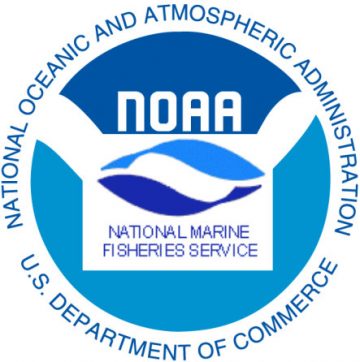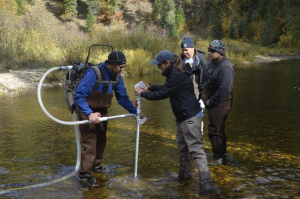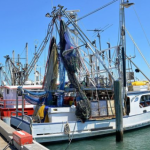Public Comment Period on Several EOs to Review and Streamline Regulatory Processes and Reduce Regulatory Burden Opens
 As part of ongoing efforts to evaluate and improve our regulations and regulatory processes, NOAA through NMFS and NOS seeks public input on identifying existing regulations that: Eliminate jobs, or inhibit job creation; are outdated, unnecessary, or ineffective; impose costs that exceed benefits; create a serious inconsistency or interfere with regulatory reform initiatives and policies; are inconsistent with the requirements of section 515 of the Treasury and General Government Appropriations Act, 2001; and/or derive from or implement Executive Orders or other Presidential directives that have been subsequently rescinded or substantially modified. NMFS and NOS also seek public comment on the efficiency and effectiveness of current regulatory processes, and specifically, if current regulatory processes can be further streamlined or expedited in a manner consistent with applicable law.
As part of ongoing efforts to evaluate and improve our regulations and regulatory processes, NOAA through NMFS and NOS seeks public input on identifying existing regulations that: Eliminate jobs, or inhibit job creation; are outdated, unnecessary, or ineffective; impose costs that exceed benefits; create a serious inconsistency or interfere with regulatory reform initiatives and policies; are inconsistent with the requirements of section 515 of the Treasury and General Government Appropriations Act, 2001; and/or derive from or implement Executive Orders or other Presidential directives that have been subsequently rescinded or substantially modified. NMFS and NOS also seek public comment on the efficiency and effectiveness of current regulatory processes, and specifically, if current regulatory processes can be further streamlined or expedited in a manner consistent with applicable law.
Comments are due August 21, 2017. You may submit comments by either of the following methods:
Electronic Submission: Submit all electronic public comments via the Federal e-Rulemaking Portal. Go to http://www.regulations.gov/#!docketDetail;D=NOAA-NMFS-2017-0067, click the “Comment Now!” icon, complete the required fields, and enter or attach your comments.
Mail: Submit written comments to Kelly Denit, National Marine Fisheries Service, NOAA, Office of Sustainable Fisheries, 1315 East-West Highway, Silver Spring, MD 20910 (mark outside of envelope “Streamlining Regulatory Processes and Reducing Regulatory Burden”).
For further information contact Kelly Denit at: 301-427-8500. To see the Federal Register Notice click here. (This is where the beef is!)
( I went to check the links before publishing, and wouldn’t you know it, the link is broken! Here is the entry in the Federal Register.)
Streamlining Regulatory Processes and Reducing Regulatory Burden
A Notice by the National Oceanic and Atmospheric Administration on 07/07/2017
This document has a comment period that ends in 42 days. (08/21/2017)
Submit a formal comment
Document Details
Printed version:
PDF
Publication Date:
07/07/2017
Agencies:
National Oceanic and Atmospheric Administration
Dates:
Comments are due August 21, 2017.
Comments Close:
08/21/2017
Document Type:
Notice
Document Citation:
82 FR 31576
Page:
31576-31579 (4 pages)
RIN:
0648-XF49
Document Number:
2017-14167
Document Details
Enhanced Content
Docket Number:
NOAA-NMFS-2017-0067
Public Comments:
0 comments
Enhanced Content
0
Published Document
AGENCY:
National Marine Fisheries Service (NMFS) and National Ocean Service (NOS), National Oceanic and Atmospheric Administration (NOAA), Commerce.
ACTION:
Notice; request for comments.
SUMMARY:
As part of ongoing efforts to evaluate and improve our regulations and regulatory processes, NOAA through NMFS and NOS seeks public input on identifying existing regulations that: Eliminate jobs, or inhibit job creation; are outdated, unnecessary, or ineffective; impose costs that exceed benefits; create a serious inconsistency or interfere with regulatory reform initiatives and policies; are inconsistent with the requirements of section 515 of the Treasury and General Government Appropriations Act, 2001; and/or derive from or implement Executive Orders or other Presidential directives that have been subsequently rescinded or substantially modified. NMFS and NOS also seek public comment on the efficiency and effectiveness of current regulatory processes, and specifically, if current regulatory processes can be further streamlined or expedited in a manner consistent with applicable law.
DATES:
Comments are due August 21, 2017.
ADDRESSES:
You may submit comments on this document, identified by NOAA-NMFS-2017-0067, by either of the following methods:
Electronic Submission: Submit all electronic public comments via the Federal e-Rulemaking Portal. Go to http://www.regulations.gov/#!docketDetail;D=NOAA-NMFS-2017-0067, click the “Comment Now!” icon, complete the required fields, and enter or attach your comments.
Mail: Submit written comments to Kelly Denit, National Marine Fisheries Service, NOAA, Office of Sustainable Fisheries, 1315 East-West Highway, Silver Spring, MD 20910 (mark outside of envelope “Streamlining Regulatory Processes and Reducing Regulatory Burden”).
Instructions: Comments must be submitted by one of the above methods to ensure that the comments are received, documented, and considered by NMFS and/or NOS. Comments sent by any other method, to any other address or individual, or received after the end of the comment period, may not be considered. All comments received are a part of the public record and will generally be posted for public viewing on www.regulations.gov without change. All personal identifying information (e.g., name, address, etc.) submitted voluntarily by the sender will be publicly accessible. Do not submit confidential business information, or otherwise sensitive or protected information. NMFS and/or NOS will accept anonymous comments (enter “N/A” in the required fields if you wish to remain anonymous).
FOR FURTHER INFORMATION CONTACT:
Kelly Denit, (301) 427-8500.
SUPPLEMENTARY INFORMATION:
Background
A series of recent Executive Orders aimed at eliminating, improving, and streamlining current regulations and associated regulatory processes in a variety of areas have been issued. On January 24, 2017, President Trump issued Executive Order (E.O.) 13766, “Expediting Environmental Reviews and Approvals for High Priority Infrastructure Projects” (82 FR 8657, January 30, 2017). This E.O. requires infrastructure decisions to be accomplished with maximum efficiency and effectiveness, while also respecting property rights and protecting public safety. Additionally, the E.O. makes it a policy of the executive branch to “streamline and expedite, in a manner consistent with law, environmental reviews and approvals for all infrastructure projects.”
On January 30, 2017, President Trump issued E.O. 13771, “Reducing Regulation and Controlling Regulatory Costs” (82 FR 9339, February 3, 2017). E.O. 13771 provides that “it is essential to manage the costs associated with the governmental imposition of private expenditures required to comply with Federal regulations.” Toward that end, E.O. 13771 directs that “for every one new regulation issued, at least two prior regulations be identified for elimination, and that the cost of planned regulations be prudently managed and controlled through a budgeting process.”
On February 24, 2017, President Trump issued E.O. 13777, “Enforcing the Regulatory Reform Agenda,” which established a federal policy “to alleviate unnecessary regulatory burdens placed on the American people” (82 FR 12285, March 1, 2017). Among other issues, E.O. 13777 directs Federal agencies to establish a Regulatory Reform Task Force (Task Force), which will “evaluate existing regulations and make recommendations to the agency head regarding their repeal, replacement, or modification, consistent with applicable law.” Further, the E.O. directs each Task Force to identify regulations that meet the following criteria: Eliminate jobs, or inhibit job creation; are outdated, unnecessary, or ineffective; impose costs that exceed benefits; create a serious inconsistency or otherwise interfere with regulatory reform initiatives and policies; are inconsistent with the requirements of section 515 of the Treasury and General Government Appropriations Act, 2001; and/or derive from or implement Executive Orders or other Presidential directives that have been subsequently rescinded or substantially modified. Section 3(e) of
Start Printed Page 31577
E.O. 13777 directs the Task Force to “seek input and other assistance, as permitted by law, from entities significantly affected by Federal regulations,” on regulations that meet any of the criteria mentioned above. Through this notice, NMFS and NOS solicit such input from the public to inform NOAA and the Department of Commerce Task Force’s evaluation of existing regulations.
On March 28, 2017, President Trump issued E.O. 13783, entitled “Promoting Energy Independence and Economic Growth” (82 FR 16093, March 31, 2017). Among other things, E.O. 13783 requires the heads of agencies to review all existing regulations, orders, guidance documents, policies, and any other similar agency actions (collectively, agency actions) that potentially burden the development or use of domestically produced energy resources, with particular attention to oil, natural gas, coal, and nuclear energy resources. Such review does not include agency actions that are mandated by law, necessary for the public interest, and consistent with the policy set forth elsewhere in that Executive Order.
Lastly, on April 28, 2017, President Trump issued E.O. 13795, “Implementing an America-First Offshore Energy Strategy” (82 FR 20815, April 28, 2017). Among the requirements of E.O. 13795 is section 10, which calls for a review of NMFS’ Technical Guidance for Assessing the Effects of Anthropogenic Sound on Marine Mammal Hearing as follows: “The Secretary of Commerce shall review NOAA’s Technical Memorandum NMFS-OPR-55 of July 2016 (Technical Guidance for Assessing the Effects of Anthropogenic Sound on Marine Mammal Hearing) for consistency with the policy set forth in Section 2 of this order and, after consultation with the appropriate Federal agencies, take all steps permitted by law to rescind or revise that guidance, if appropriate.” In response, NMFS published a notice in the Federal Register requesting comments relating to the review of the Technical Guidance under section 10 of E.O. 13795 (82 FR 24950, May 31, 2017). Therefore, the public does not need to provide comments on this topic in response to this particular notice.
It is important to note the Administration has already requested comment on the review of certain Marine National Monuments and National Marine Sanctuaries via two previous notices. Under Executive Order 13792, “Review of Designations Under the Antiquities Act” (signed April 26, 2017), the Department of the Interior is conducting a review of national monuments (See the Department of the Interior’s Federal Register Notice “Review of Certain National Monuments Established Since 1996; Notice of Opportunity for Public Comment;” 82 FR 22016, May 11, 2017). The Department of Commerce is collaborating with the Department of the Interior on this review for marine national monuments, in conjunction with Department of Commerce’s review under Executive Order 13795. Pursuant to Executive Order 13795, “Implementing an America-First Offshore Energy Strategy” (signed on April 28, 2017), the Department of Commerce is conducting a review of all designations and expansions of national marine sanctuaries and marine national monuments since April 28, 2007 (82 FR 28827, June 26, 2017). Therefore, the public does not need to provide comments on these topics in response to this particular notice.
In accordance with the Administration’s Executive Orders cited above, NMFS and NOS invite comment from the public, including entities significantly affected by Federal regulations, as well as State, local, and tribal governments, small businesses, consumers, non-governmental organizations, and trade associations. Since the regulations and processes NMFS and NOS follow under each of the topics identified in the Executive Orders are similar, we are issuing a single request for comment to ensure the public has the opportunity to comment in a coordinated fashion and do not have to respond to multiple requests for comment.
In addition to the executive orders cited, NMFS and NOS invite comment related to the application of Federal Regulations to marine aquaculture. Currently, the permitting for marine aquaculture is a complicated, multi-agency, multi-step process, and NMFS and NOS seek comment on improvements that can be made by the Department of Commerce within legislative mandates, including suggestions on interagency processes. Information about the role of NMFS, NOS, and other federal agencies in the regulation of marine aquaculture is available online at http://www.nmfs.noaa.gov/aquaculture/policy/24_regulating_aquaculture.html.
List of Processes and Regulations for Commenters
NMFS and NOS specifically request comments on existing processes and regulations under the agencies’ statutory mandates. NMFS and NOS are broadly seeking comments on any existing Agency regulation the public thinks meet the criteria described in this background section. A brief description of each statute is provided below and examples of regulations the public may choose to comment on are provided in some cases. Additionally, NMFS and NOS request comments on existing processes and regulations for marine aquaculture.
Existing Processes and Regulations Under the Agencies’ Statutory Mandates
a. Marine Mammal Protection Act (MMPA), 16 U.S.C. 1361 et seq.
The Marine Mammal Protection Act (MMPA) generally prohibits the “take” of marine mammals by U.S. citizens or by any person or vessel in waters under U.S. jurisdiction, with certain exceptions.
Authorizations under Section 101(a)(5) for the take of marine mammals incidental to certain activities. Sections 101(a)(5)(A) & (D) of the MMPA allow for the authorization of take of small numbers of marine mammals by U.S. citizens who engage in a specified activity (other than commercial fishing) within a specified geographical region, provided certain findings are made and appropriate mitigation, monitoring, and reporting requirements are set forth. NMFS has issued regulations implementing standards and procedures for the 101(a)(5) process.
b. Endangered Species Act (ESA), 16 U.S.C. 1531 et seq.
The Endangered Species Act of 1973 (ESA) provides for the conservation of species that are endangered or threatened throughout all or a significant portion of their range, and the conservation of the ecosystems on which they depend.
Section 7(a)(1) coordination with other Federal agencies to help conserve listed species and the habitats on which they depend. Federal agencies, under section 7(a)(1) of the Endangered Species Act (ESA), must utilize their authorities to carry out programs to conserve threatened and endangered species. NOAA Fisheries assists these agencies with the development of these conservation programs for marine species.
Section 7(a)(2) consultations (both formal and informal) with Federal agencies on Federal activities which may affect a listed species. For example, NMFS has endeavored to improve this consultation process by increasing the use of programmatic consultations for projects of a similar nature.
c. Magnuson-Stevens Fishery Conservation and Management Act
Start Printed Page 31578
(Magnuson-Stevens Act), 16 U.S.C. 1801 et seq.
The Magnuson-Stevens Fishery Conservation and Management Act is the primary law governing marine fisheries management in U.S. federal waters. First passed in 1976, the Magnuson-Stevens Act fosters long-term biological and economic sustainability of our nation’s marine fisheries out to 200 nautical miles from shore. Key objectives of the Magnuson-Stevens Act are to: Prevent overfishing, rebuild overfished stocks, increase long-term economic and social benefits, and ensure a safe and sustainable supply of seafood.
Exempted fishing permits (50 CFR 600.745(b)). Exempted fishing permits (EFPs) allow necessary research activities that would normally be prohibited by regulations. They are issued to individuals for the purpose of conducting research or other fishing activities using private (non-research) vessels.
Consultations (both informal and formal) under Essential Fish Habitat (EFH) provisions. An example of how NMFS has worked to increase the efficiency of EFH consultations is the implementation of programmatic consultations—which reduces the overall number of individual consultations and/or the amount of time EFH consultations take. Programmatic consultations also allow for a more rapid assessment of impacts to relevant species.
d. Federal Power Act, 16 U.S.C. 791 et seq.
Conducting studies for hydropower project licensing and relicensing. A project license applicant must consult and, as appropriate, conduct studies with NMFS and other fish and wildlife agencies. An example of how NMFS could improve the efficiency of studies and consultations under the Federal Power Act is by requesting hydropower project license applicants to conduct the appropriate studies on a watershed basis. By working with relevant Federal and state resource agencies, as well as license applicants, to identify, request, and implement studies on a watershed basis for hydropower project licensing and relicensing processes, the overall time and money spent could be reduced in relation to the current project-by-project process.
e. National Marine Sanctuaries Act (NMSA), 16 U.S.C. 1431 et seq.
Interagency consultations under Section 304(d) of the NMSA. Section 304(d) of the NMSA requires interagency consultation between NOAA and federal agencies taking actions, including authorization of private activities, “likely to destroy, cause the loss of, or injure a sanctuary resource.” For example, the Office of National Marine Sanctuaries (ONMS) has worked to integrate the consultation process under the NMSA with other consultation processes under ESA and MMPA, when applicable, for a more efficient and coherent approach to consultation under the NOAA umbrella.
Program implementation regulations (15 CFR part 922). ONMS regulations prohibit specific kinds of activities, describe and define the boundaries of the designated national marine sanctuaries and set up a system of permits to allow the conduct of certain types of activities.
f. Coastal Zone Management Act (CZMA), 16 U.S.C. 1451 et seq.
Program implementation regulations (15 CFR parts 923 or 930). The CZMA addresses the nation’s coastal issues through a voluntary partnership between the federal government and coastal and Great Lakes states and territories to provide the basis for protecting, restoring, and developing our nation’s diverse coastal communities, resources, and economies. Currently 34 coastal states participate in the Act and NOAA’s CZMA regulations gives states the flexibility to design unique programs that best address their coastal challenges and regulations.
Marine Aquaculture
a. Application of the existing NMFS and NOS processes and regulations listed above to marine aquaculture, including interagency processes and coordination with other federal agencies and states; and
b. Regulation of offshore marine aquaculture in federal waters under the Magnuson-Stevens Act.
Considerations for Commenters
To maximize the usefulness of comments, NMFS and NOS encourage commenters to provide the following information:
a. Specific reference. A specific reference to the process or regulation that imposes the burden that the comment discusses. This should be a citation to the Code of Federal Regulations, a guidance document number, or other relevant agency document(s). A specific reference will assist NMFS and/or NOS with identifying the requirement, the original source of the requirement, and relevant documentation that may describe the history and effects of the requirement.
b. Description of burden. A description of the burden that the identified process or regulation imposes on businesses, States, tribes, or other affected entities. A comment that describes how the process or regulation impedes efficiency is more useful than a comment that merely asserts that it is burdensome. Comments that reflect experience with the requirement and provide data describing that experience are more credible than comments that are not tied to direct experience. Verifiable, quantifiable data describing burdens are more useful than anecdotal descriptions.
c. Description of more effective or less burdensome alternative(s). If the commenter believes that the objective that motivated the process or regulation may be achieved using a more effective alternative, the commenter should describe that alternative in detail. Likewise, if the commenter believes that there is not a more effective alternative or there is not a legitimate objective motivating the requirement, then that should be explained in the comment.
Current Review Processes
Processes associated with the Magnuson-Stevens Act (Act) currently provide opportunities for public review. The Act created eight regional Fishery Management Councils (Councils) responsible for the fisheries that require conservation and management in their region. The Councils are designed to be a stakeholder-driven management body and thus, most of the voting members of a Council are active in or have unique knowledge of the fisheries in their geographic region. Through these Councils, stakeholders provide direct and substantive input into the development and regular modification of fishery management plans and regulations. Councils balance both conservation and management needs for a fishery with the operational needs of fishing businesses. NMFS and the Councils work together to revise or remove regulations identified by stakeholders that are outdated, ineffective, insufficient, or excessively burdensome to the relevant fishery. Therefore, any public comments received on Council regulations will be forwarded to the appropriate Council for consideration.
Additionally, NMFS is reviewing regulations, as required, under section 610 of the Regulatory Flexibility Act (RFA), 5 U.S.C. 601 et seq., which had, or will have, a significant impact on a substantial number of small entities, such as small businesses, small organizations, and small governmental jurisdictions. Per section 610(c) of the RFA, NMFS published a notice in the Federal Register listing the regulations currently under review (82 FR 26419, June 7, 2017). Public comments received
Start Printed Page 31579
on both the RFA section 610 notice and this notice will inform NMFS’ regulatory reviews required under relevant Executive Orders, including E.O 13771, “Reducing Regulation and Controlling Regulatory Costs,” and E.O. 13777, “Enforcing the Regulatory Reform Agenda.”
Finally, comments related to statutory changes will not be considered as part of this notice; however, NMFS and/or NOS will take them into account in the future if needed.
Dated: June 30, 2017.
Samuel D. Rauch III,
Deputy Assistant Administrator for Regulatory Programs, National Marine Fisheries Service.
[FR Doc. 2017-14167 Filed 7-6-17; 8:45 am]
BILLING CODE 3510-22-P










































